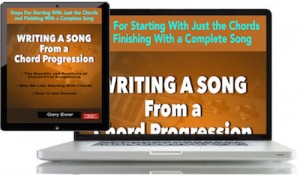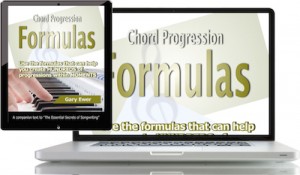When you ask songwriters to describe their songwriting process, the answer you invariably get is, “It depends…” That’s the answer we tend to expect, and of course it really does depend, doesn’t it? If you are like most songwriters, you’ll find that a short fragment of music will plant itself in your brain, and that serves as a kind of germ that eventually grows into a complete song.
So your process is going to be determined by, in large part at least, what that fragment is. If it’s a chord progression with a catchy rhythmic treatment, you’ll likely find yourself going with that for a while, seeing if you can build on that progression until you’ve got a working foundation for a chorus. Essentially, that’s a chords-first process.
 Are you a chords-first songwriter? You need this manual: “Writing a Song From a Chord Progression.” It gives you a step-by-step process for getting the most of working from a chord progression. It’s part of the 10-eBook package. READ MORE..
Are you a chords-first songwriter? You need this manual: “Writing a Song From a Chord Progression.” It gives you a step-by-step process for getting the most of working from a chord progression. It’s part of the 10-eBook package. READ MORE..
If you’ve come up with a snippet of lyric that you like, you’ll probably see what you can do to propagate that into a complete song section: the lyrics-first method.
So if we always assume that we’re going to get “It depends” as an answer to the “What process do you use?” question, I wonder why we ask it?
I think there are two reasons. The first is obvious, which is that we stand to learn something new about songwriting if we engage in that conversation, and that’s great. But I think there’s a second reason we ask the question: we want/need validation for the way we write music.
When it comes to the many possible songwriting processes that exist, consider the following:
- You should take comfort in the fact that there is no one best process, or way of starting a song.
- You should take comfort in the fact that there is no wrong way to start a song, no wrong way to write a song at all.
- If you start your songs the same way each time, you run the risk of your songs all having an unpleasant sameness.
- Each individual song process has potential pros and cons.
- Starting a song using an instrument you don’t normally play can be as beneficial as developing a new songwriting process.
Songwriting rewards the writers who constantly look for something new, whether that’s a new process, a new instrument or instrument grouping to try, or a genre you don’t normally write in.
So in that sense, the best answer to “How do you settle on a songwriting process?” is: “I don’t settle on any process. Every song is an opportunity to approach music in a new and innovative way.”
If you find that you already do just that — using a new approach with each and every song — that’s a strength. Stay innovative, stay creative, and don’t start two consecutive songs the same way.
 Written by Gary Ewer. Follow Gary on Twitter
Written by Gary Ewer. Follow Gary on Twitter
 “Chord Progression Formulas”show you a quick way to devise chord progressions based on Roman numeral based formulas. It’s easy, and it’s all described within this short eBook. It’s part of “The Essential Secrets of Songwriting” eBook Bundle package. Read more.
“Chord Progression Formulas”show you a quick way to devise chord progressions based on Roman numeral based formulas. It’s easy, and it’s all described within this short eBook. It’s part of “The Essential Secrets of Songwriting” eBook Bundle package. Read more.











Pingback: Eight ways to start your next song - New Artist Model
Pingback: 8 ways to start your next song | One Minute Song
Pingback: Led Zeppelin Stairway To Heaven Plagiarism Case Heads To Jury Trial [Listen And Compare] – Music Insider Daily
Where a lot of would be song writers go wrong is they dont sing there songs
Great Songs use words that sing equally well in both the High and Lower
ranges.
To attempt to be a lyric writer , and then expect a Composer to turn it into
a hit, is difficult for many, an understanding of what Patt Patterson from Berklee
College calls -The Vowel Triangle- is something we all should learn , it’s as
important as choosing the right Song Format, and the right tempo for your
storyline.